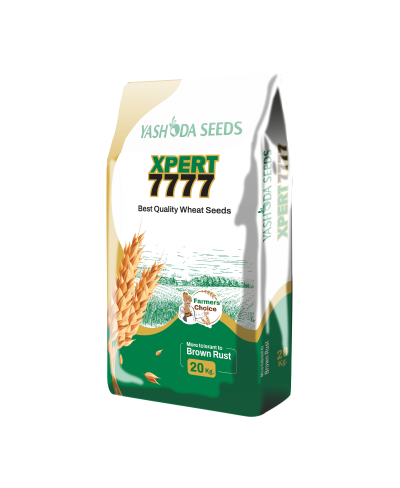
Wheat farming has been an essential part of global agriculture for centuries, feeding billions of people worldwide. However, as modern farming practices evolved, the use of synthetic chemicals became prevalent, often leading to adverse environmental effects and health concerns. In recent years, organic wheat farming has emerged as a healthier, more sustainable alternative to conventional practices. This method emphasises on growing wheat without synthetic chemicals, enhancing soil fertility, biodiversity and the overall health of ecosystems.
At Yashoda Hybrid Seeds, we are committed to help farmers transition to organic farming practices. With 29 years of experience in agriculture, we have grown to be one of the top seed suppliers in India, specialising in hybrid and research seeds for all major crops. Our mission is to ensure high-quality harvests through innovative processes, education, and the best-quality seeds. As we continue to upgrade their methods, introduce new varieties, and ensure optimal farm productivity, organic wheat farming remains an integral part of our vision for sustainability and inclusive growth.
Why Choose Organic Wheat Farming?
Organic wheat cultivation is gaining popularity because of its multiple advantages:
- Environmental Sustainability: By eliminating synthetic chemicals, organic farming helps to preserve soil health and biodiversity. It decreases soil degradation and water contamination, making agriculture more sustainable in the long run.
- Healthier Crops: Organic wheat contains no chemical residues, making it healthier for consumers. This also addresses the market’s growing desire for organic food.
- Improved Soil Health: Organic farming focuses on enriching the soil, which helps to maintain fertility and ensures long-term productivity.
- Economic Benefits: While organic farming may have greater initial costs, there is an increasing demand for organic wheat, which could lead to higher returns for farmers.
Here’s a step-by-step guide on growing wheat organically without using synthetic pesticides, from selecting the best wheat seeds to nurturing the crop with eco-friendly approaches.
- Choose High-Quality Organic Wheat Seeds
The foundation of a successful organic wheat farm starts with selecting the right wheat seeds. Yashoda Hybrid Seeds provides premium organic wheat seeds that are specifically designed to thrive in chemical-free environments. We ensure that their seeds meet high-quality standards to yield an optimal harvest without the need for synthetic fertilisers or pesticides.
When choosing seeds, opt for varieties that are naturally resistant to pests and diseases. The right wheat seed will not only produce a strong yield but also maintain the nutritional value that modern consumers demand.
- Preparing the Soil
Healthy soil is the cornerstone of organic farming. Start by conducting a soil test to determine its nutrient content and pH levels. Ideally, the pH for growing wheat should be between 6.0 and 7.5. Using natural soil amendments such as compost, organic manure, and green manure crops may help to enrich the soil as they provide essential nutrients like nitrogen, phosphorus, and potassium necessary for wheat growth. Additionally, practices such as crop rotation and cover cropping help maintain soil health and prevent erosion, ensuring that your soil remains fertile year after year.
- Sowing the Wheat Seeds
Timing is crucial when sowing wheat seeds. For organic farming, it is best to sow wheat in a well-prepared seedbed during the cooler months. Early sowing allows the crop to establish itself before the onset of any major pest or weed problems.
- Natural Weed Control
Weed management is one of the most significant challenges in organic wheat farming since synthetic herbicides are not an option. The most common natural weed control method is Mechanical Weeding, which involves using tools to manually remove weeds. Techniques such as mulching with straw or organic matter can also suppress weed growth while improving soil moisture retention. Crop rotation is another powerful method to manage weeds. By alternating wheat with other crops such as legumes, farmers can naturally reduce weed populations over time.
- Pest and Disease Management
Pests and diseases can hinder wheat production, but organic farming offers several natural ways to combat these threats. Yashoda Seeds provides pest-resistant wheat seed varieties, reducing the risk of infestation. Moreover, planting companion crops like clover can help deter pests by creating a more diverse ecosystem. Organic farmers often rely on biopesticides, which are derived from natural substances like neem oil or garlic extract, to manage diseases without harmful chemicals.
- Fertilisation with Organic Matter
Organically fertilising wheat crop involves using compost, green manure, and animal manure. These materials release nutrients slowly, ensuring a consistent nutrient supply throughout the growing season. Cover crops like legumes can also fix nitrogen into the soil, improving fertility naturally. At Yashoda Hybrid Seeds, we educate farmers on the best practices for organic fertilisation to promote healthier, more productive crops.
- Harvesting Organic Wheat
Once the wheat matures, it’s time for harvesting. Organic wheat should be harvested when the grain moisture content is between 12-14%. Both Manual harvesting and using modern equipment can be effective, depending on the size of your farm. After harvesting, ensure that the wheat is stored in a dry and cool place to prevent contamination or spoilage.
By following these steps, you can produce a successful wheat harvest organically, providing a healthier, safer alternative to conventional farming methods.
Conclusion
At Yashoda Hybrid Seeds, our commitment to sustainability, quality, and integrity aligns perfectly with the principles of organic farming. We are dedicated to continuous improvement in agriculture, ensuring that farmers have access to the best seeds and practices. Our high-quality wheat seeds are designed to thrive in organic farming systems, promoting both food security and environmental well-being. Besides, we go beyond selling seeds by offering knowledge and support to help farmers implement sustainable farming practices effectively.
Whether you are new to organic wheat farming or a seasoned farmer, Yashoda Hybrid Seeds is here to help you achieve success in every harvest as we dream to cultivate a healthy and better future for our next generation.







